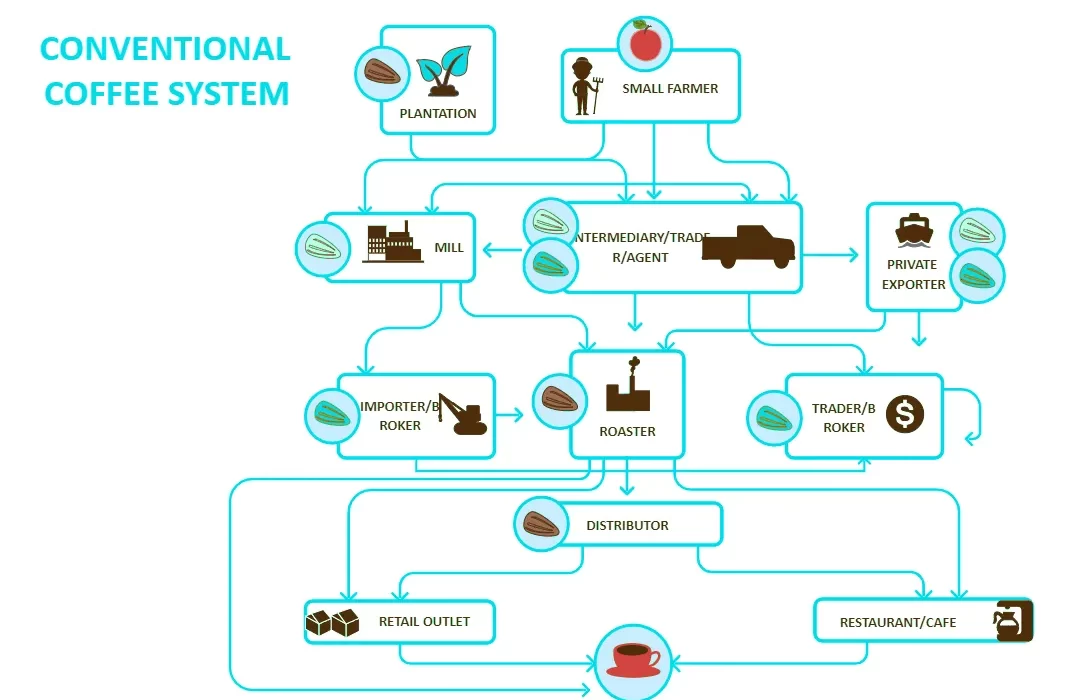With over two billion cups consumed each day, coffee is by far the world’s most popular drink. Almost every country has its unique take on the caffeinated drink, and many go to great lengths to create the perfect cup of joe.
Not only does coffee play a role in the routines of families across the globe, but it also has significant social and economic impacts on the people who work hard to produce this beloved beverage. While 90% of the world’s coffee is produced in developing countries, it has not been a reliable source of income for its farmers. Economic issues, such as limited market access for producers and lack of product and market information, coupled with depreciating market prices, all contribute to problems that farmers face every day. General market prices of coffee do not always reflect the quality of an individual’s crops, or personal financial situation.
What’s more, there are a number of big-name coffee companies claiming to be engaging in “fair trade,” when in reality they purchase their coffee through other middlemen. While exporters and middlemen may see an extra cut from this purchase, the farmers rarely do. For these reasons, farmers rarely receive fair compensation both for the extent of their work and for the value of their product.
Redesigning the coffee supply chain to increase transparency, efficiency, and win-win economic transactions can help to rectify this situation. Blockchain in the coffee supply chain can help growers see where their beans end up, and enables consumers to see where their coffee comes from. This technology can help ensure that growers are given fair payments for their crops and are maintaining sustainability practices. And it can allow consumers to make more informed decisions about where they should purchase their coffee.
While the global coffee supply chain is extremely complex, it can be roughly broken down into the following parts:
Producers/farmers: coffee farmer cultivates coffee plants and harvests cherry, a producer’s job role is to be more focused on post-harvest processing and commercial operations. In some cases, a producer may not even grow coffee at all.
Mill: This is where coffee cherries become green coffee beans. The cherries’ pulp is first removed and then the resulting seeds are dried to between 10-12%.
Brokers/commodity traders: This group refers to those who sell coffee beans to roasters in the appropriate quantities at a previously agreed upon price
Transporter/shipper: shipper is the person or company who owns or oversees goods or products for transport from one location to another. Shippers are responsible for preparing shipments for carriers to transport their goods
Exporters: Exporters are responsible for buying different types of coffee beans from co-ops or auctions, then selling it to the suppliers/brokers. Exporters often bring a level of expertise to the process; they are trained to pick out the best quality product based on their knowledge of the location and local vendors.
Importers: Importers are the bridge between the two ends of the coffee spectrum. They connect farmers with roasters. They find interesting lots of coffee, set up the logistics to move it literally around the world, and then connect roasters with the green beans that will provide consumers with a great drink
Roasters: it is a roaster’s job to see green coffee beans through the roasting process. Roasteries are often open to the public and sell the coffee right from their store.
Packagers/distributors/retailers: This group refers to those who sell/ package or distribute coffee beans to roasters in the appropriate quantities at a previously agreed upon price
However, if other members of the coffee supply chain understand the extent to which every entity is profiting from the coffee, they can work or advocate to even out the discrepancies. This transparency in profits could be one step toward bringing about fairer compensation for producers.
Furthermore, ensuring traceability throughout the entire supply chain means that the coffee’s origin, quality, and freshness can all be verified. This, in turn, allows growers who produce top-tier coffee to be recognized for their efforts and be rewarded. Full transparency demands the accountability of each member in the chain, reducing the likelihood of food fraud. And growers who produce quality crops can be rewarded accordingly.
Conclusively, the coffee industry has suffered, affecting producers and growers tremendously, while other members of the coffee supply chain have escaped comparatively unscathed. And while the third-wave coffee movement has seen prices of high-quality coffee skyrocket, producers are often left out of the increased profitability. blockchain can rectify imbalances in the coffee supply chain through full transparency and traceability. The result is greater equality and fairness for producers, as well as a more balanced and sustainable coffee industry that works better for everyone involve


